As Mali fights Islamist militants and separatists, it has turned to Wagner mercenaries for security. But the group’s leader is now presumed dead, UN peacekeepers are leaving and Mali faces a crisis. The BBC’s Feras Kilani travelled to its dangerous northern desert region – the only international journalist to go there in the past year – to meet people caught up in the chaos.
It was late in the evening when we set up camp, lit a fire to cook our dinner and laid down our blankets to sleep under the open sky. Suddenly the silence of the hot desert night was broken by the roar of a motorbike.

Around us, we heard a series of clicks as the armed men in our convoy cocked their rifles and machine guns. We were with a group of Tuareg separatists who told the man on the motorbike to move on.
As soon as he left, our hosts told us we had to leave too. Immediately. It was too risky to stay put as the man was a scout for a local group linked to al-Qaeda.
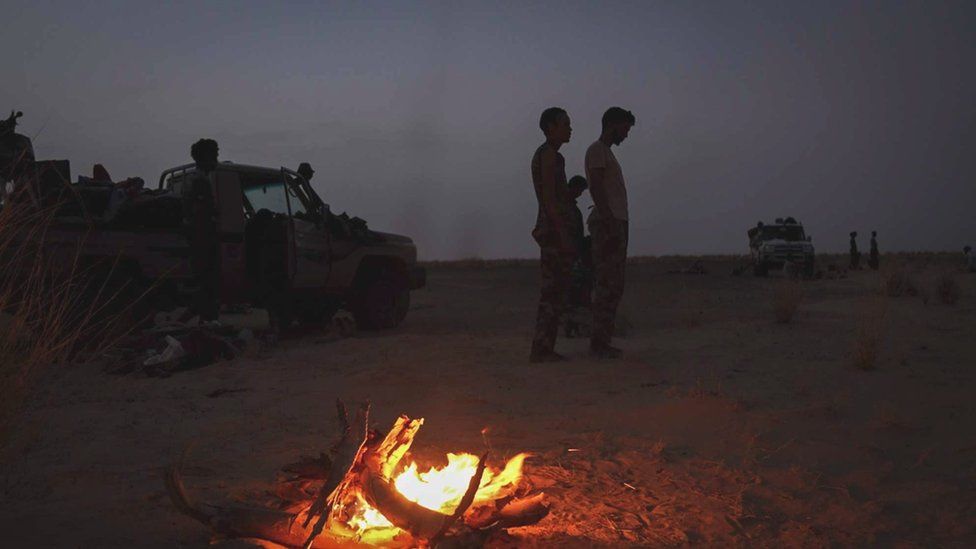
We had been careful, swapping our jeans for traditional robes and Tuareg headscarves to blend in, but if he realised foreigners were in the camp he could lead the militants to us and we could be kidnapped.
We packed up as quickly as we could and drove off into the pitch black without any headlights or torches so that we couldn’t be followed.
This part of northern Mali is beyond government control and is run by groups of Tuareg separatists and Islamist extremists linked to al-Qaeda – they don’t exactly get along but they have reached a mutual understanding to leave each other alone. But the tension and fear we experienced that night reflects a deepening crisis across the country as it slides deeper into lawlessness and chaos.
The government has turned away from international peacekeeping forces, relying on Russia’s Wagner group for security instead. But now the mercenaries’ notorious leader, Yevgeny Prigozhin, is believed to have died in a plane crash, leaving questions over operations here and fears that Mali is in an even more precarious position.
Fleeing from IS
Further to the east, the Islamic State group has established itself and is trying to increase the area it controls. We wanted to meet the civilians caught up in the violence IS fighters have brought with them. So we drove more than 1,000km (650 miles) through the desert to the city of Kidal in the east of Mali. When we arrived, we saw camps where thousands of refugees are living after fleeing their homes.
“Islamic State forced us to come here,” Fatima told us, sitting on the floor of a makeshift tent – a rough piece of material propped up by a few branches. She is in her 60s and this is now her home, with her daughter and two of her grandchildren by her side.
Her husband and son-in-law were killed when IS attacked the village where they used to live.
“They killed all our men and burned all our food and animals,” she added. Others told us similar stories of how their supplies of grain, sheep and camels had been destroyed, leaving them with nothing. Many of the youngest children we saw had no clothes or shoes.
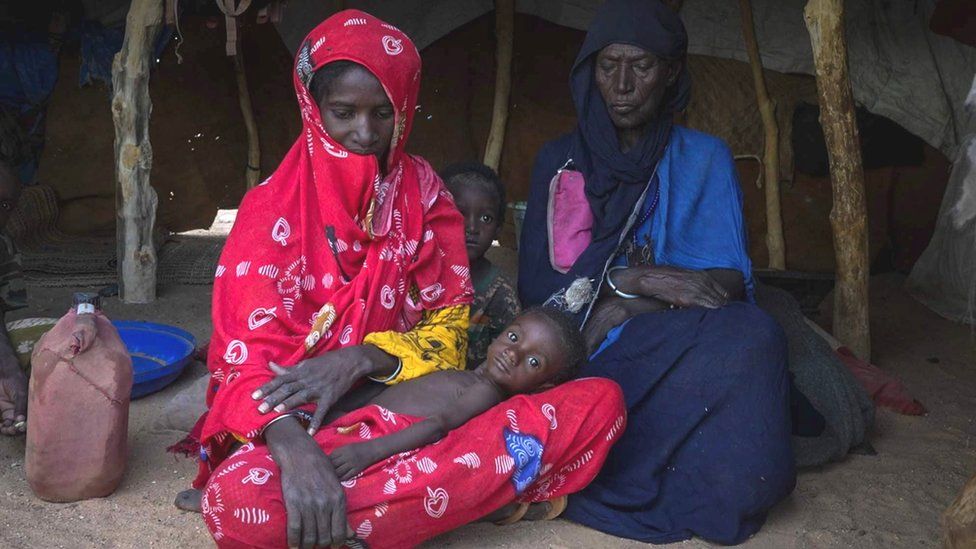
Fatima, and what remains of her family, walked hundreds of kilometres to reach Kidal from her old home in Menaka state in eastern Mali.
As we had seen for ourselves, travelling across the desert is tough. There are no paved roads, just rough routes marked in the sand by vehicles that have passed through before. The sand stretches as far as you can see, sometimes dotted with trees and shrubs.
There’s not much for people in Kidal, but at least they can survive. “We found water and shelter, so we stayed,” Fatima said. People in these camps get some basic assistance from local NGOs but there isn’t much.
We also met Musa Ag Taher, one of the few men in the camp. Islamic State fighters attacked his home too. “When IS entered the town I buried myself until they left and then I managed to escape with my family,” he said. He described how he dug a shallow pit in the ground and covered himself with sand to hide. He managed to escape with his four children.
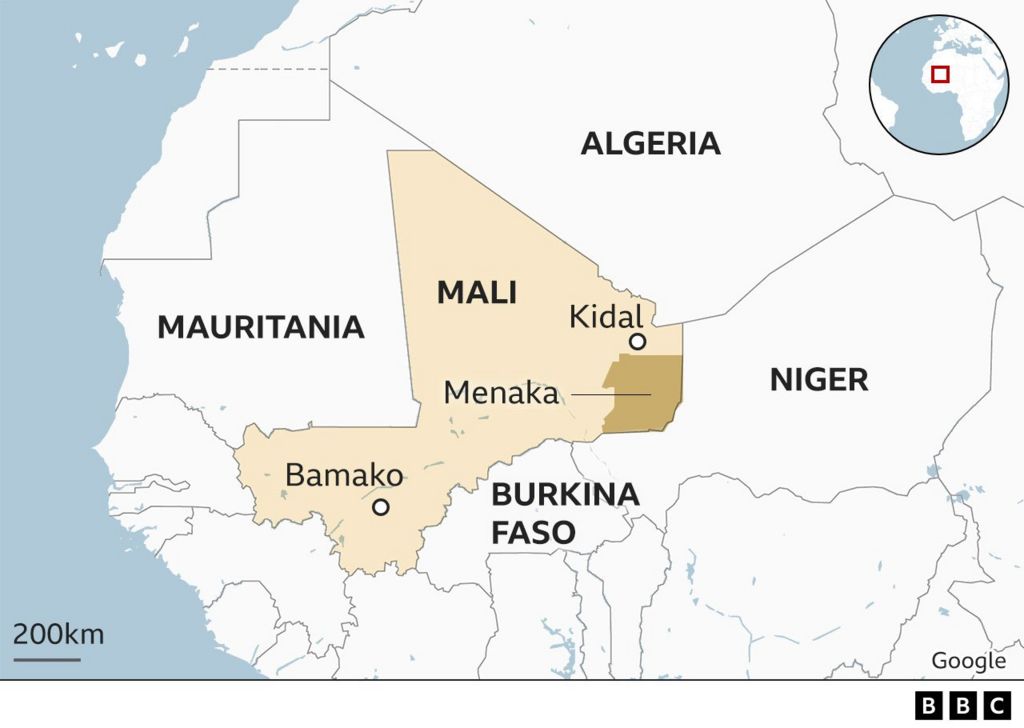
Turning to Wagner
Though Kidal is safer than the areas Fatima and Musa left behind, there are fears the situation is about to get worse.
In 2012, the military staged a coup, while rebels and Islamist fighters took control of the north, declaring an independent state in the region. A new interim government asked French troops to come and fight the Islamist extremists. A few months after their arrival in 2013, the UN sent an international force called Minusma to keep the peace.
The country’s military leaders seized power again in 2020 – since then the junta has distanced itself from France, its former colonial ruler, and French troops have been sent home.
In 2021 the government invited Wagner to Mali to help with security and soon the Russian mercenary group will be the only outside force providing military support. The government has told the UN’s 12,000 peacekeepers to leave – they are now in the process of pulling out.
We visited a UN base in Kidal that is due to close in November. Huge sandbags topped with coils of razor wire had been set up around the entrance for security. Beyond, we could see people in blue helmets and rows of white vehicles with UN markings.
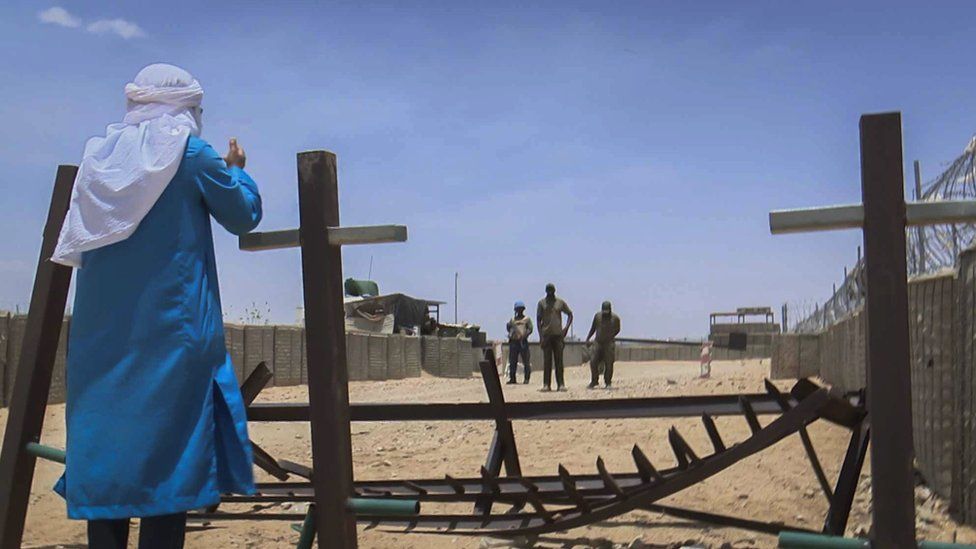
The security guard at the gate called someone on his radio and three men appeared. They asked us to stop filming and explained that because they were preparing to leave they wouldn’t be able to give us an interview.
Local groups are worried that when these UN forces go, they will leave a power vacuum with IS, militants affiliated to al-Qaeda and separatists all fighting for control.
There are believed to be about 1,000 Wagner soldiers in Mali – less than a tenth of the size of the UN force they are replacing and there are fears they will be even less effective at countering jihadist groups.
And earlier this year, the UN accused Wagner of committing atrocities alongside the Malian army, describing “alarming accounts of horrific executions, mass graves, acts of torture, rape and sexual violence” in the Mopti area. It also described how Malian soldiers, overseen by Wagner fighters, killed around 500 mostly unarmed civilians in a village. The Malian government denied any wrongdoing.
At a nearby compound we met a group of separatists from the Tuareg ethnic group who control Kidal. They are worried that Mali’s military government, who control the south of the country, might try to seize what is left of the UN base when the international force pulls out. He says this could lead to renewed fighting.
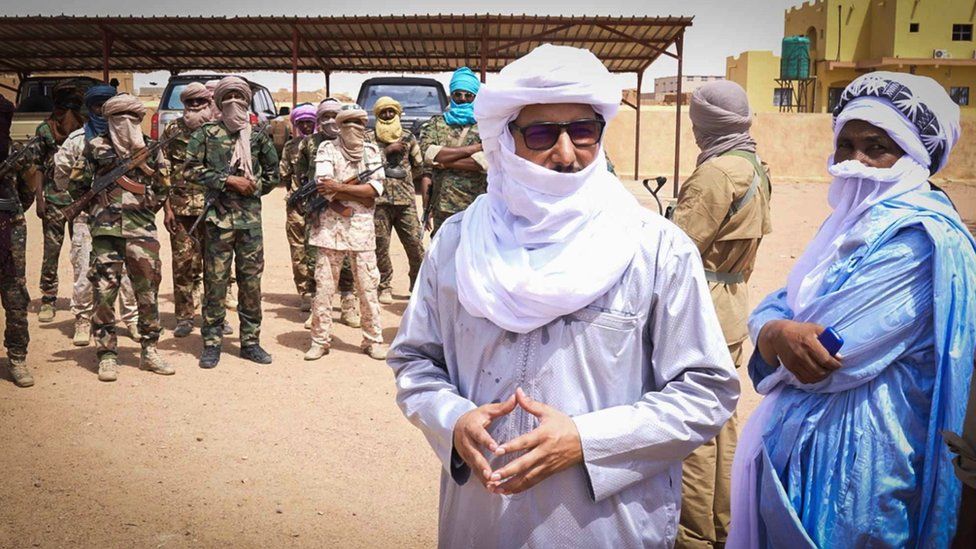
“If these camps are handed over by Minusma to the Malian army, Minusma will be responsible for what happens next,” Bilal Ag Sharif, the local Tuareg leader, told us.
“The Malian government will also be responsible because it is demanding something that is not its right, and we will not accept it,” he added, making it clear his group will not give up control of the region without a struggle.
As well as providing security, the 12 UN bases across Mali also support about 10,000 local jobs. They employ translators, drivers, people to distribute food and provide services such as street lighting and some very basic healthcare.
“It will leave these people without any work without any hope, without any source [of income] to feed their families,” Sharif told us. He’s worried Islamist militant groups will step in and benefit.
“This will give extremist groups new opportunities for recruitment,” he said.
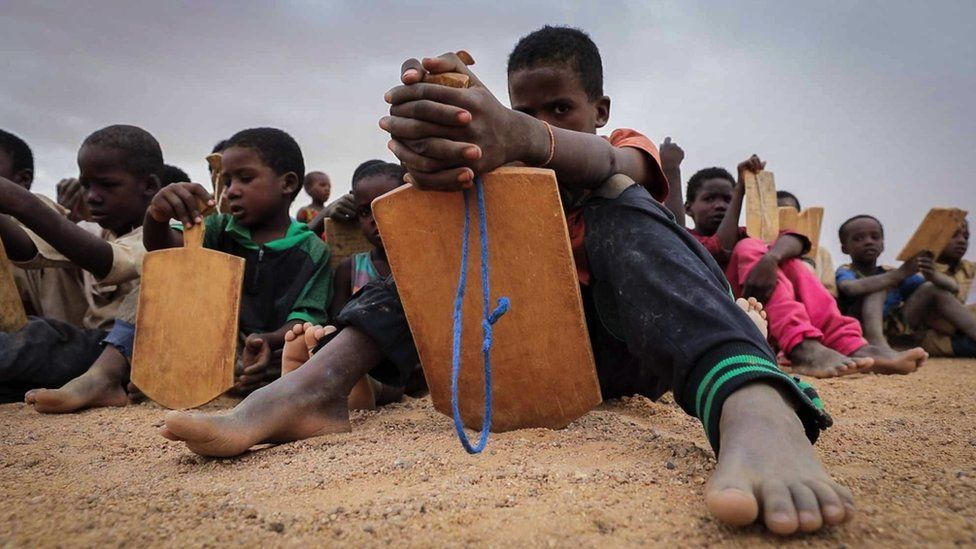
In the refugee camp we had seen rows of children huddled on the ground of a makeshift school.
A teacher hit their heads with a cane as they recited verses from the Quran.
Their parents had been killed by IS and it was easy to see how they could be targeted and recruited by militant groups as they grow up.
Russian interest
The motivation of the Wagner group in the region has been questioned, however. The US government has accused it of running gold and diamond mines in other African countries, saying it is a “destabilising force”, mainly interested in profiting from natural resources.
A few days before the plane crash in Russia, Yevgeny Prigozhin appeared in a video which suggested he was in Africa.
The BBC has not been able to verify where the video was filmed, but in it, Prigozhin said the group was making Africa “more free” and that Wagner was exploring for minerals as well as fighting Islamist militants and other criminals.
Just outside Kidal, we visited one of Mali’s many gold processing plants. It’s only a small operation, with little heavy machinery and much of the panning and smelting is done by hand.
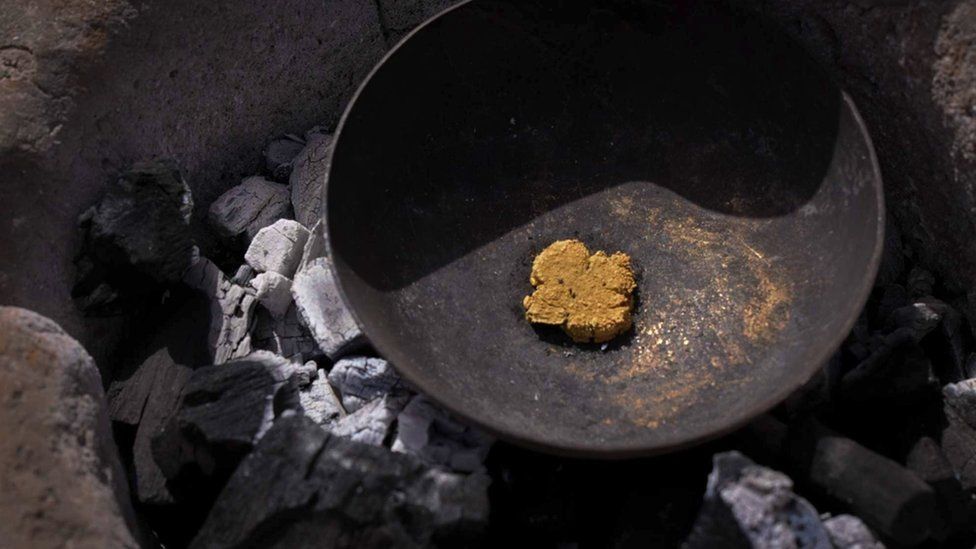
But with hundreds of sites like this across the country, Mali manages to produce more than 60 tonnes of gold a year, making it one of Africa’s top five exporters of the precious metal.
Tuareg groups are worried that Wagner soldiers might try to seize control of the local gold industry and sites like this one. If they do, Sharif warns there will be bloodshed.
Regional threat
The UN has warned that the threat from jihadist groups has increased across Mali, Niger and Burkina Faso in the past year.
All three countries have had military coups, with civilian governments pushed out of power in Burkina Faso in 2022 and in Niger in July this year.
And with Wagner’s future now uncertain, it’s unclear how much Mali can rely on the group for security. If the situation within the country deteriorates further, it could have a knock-on effect causing wider instability in the region.
Source: BBC NEWS

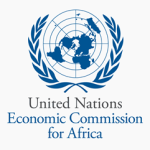





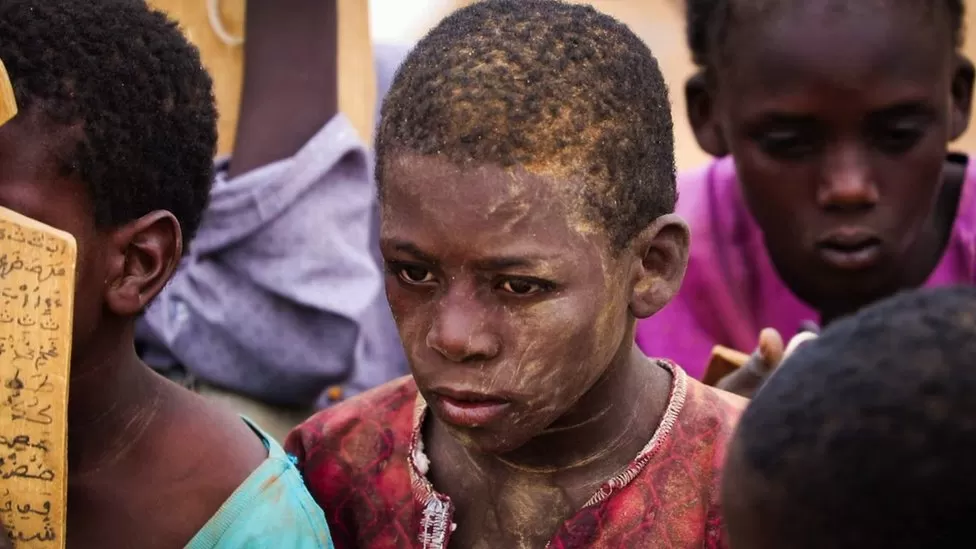



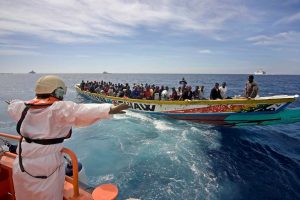








Add Comment